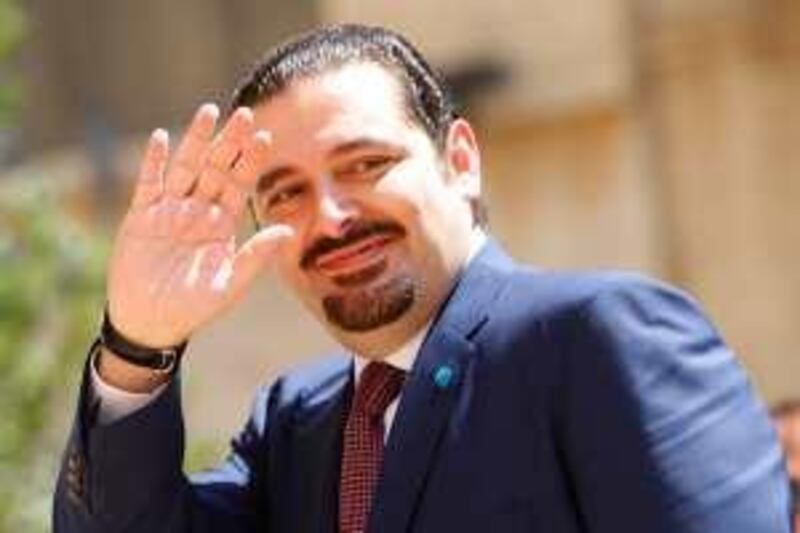DAMASCUS // Syria is ready to host Saad Hariri, the Lebanese prime minister-designate, a man not long ago considered persona non grata in Damascus and viewed as one of Syria's central opponents in the Middle East. "The doors to Damascus are open to all Lebanese and if Saad al Hariri becomes prime minister he is welcome here," said Umran al Zaubie, a Syrian lawyer and political analyst with close ties to the government. "Syria will never close the door, despite all of the lies that were told and all of the allegations that were made against her. "The Syrians are not personal or emotional when it comes to matters of international politics, so the past will not be an obstacle." No visit has yet been confirmed, although speculation is rife that it is only a matter of time before Mr Hariri makes the short trip from Beirut to Damascus. If it does happen, it would be a remarkable turn around, underlining a series of recent changes in the political map of the Middle East. "If Saad al Hariri wants to work in Lebanon's interests, if he wants to be Lebanon's leader then he surely must come to Syria," Mr Zaubie said. "If he does come here and meets with [Syrian] President Bashar al Assad, it will [symbolise] a big shift." When Rafik Hariri, a former Lebanese prime minister, was assassinated in February 2005, Syria was widely accused of orchestrating the murder, not least by Mr Hariri's son and political heir, Saad. He quickly became one of the leading anti-Syrian figures in Lebanon, heading the protest movement that forced Damascus to end a 29-year-long military presence in its smaller neighbour. The troop pull-out was seen as a major political setback for Syria and the Hariri killing hung like a black cloud over Damascus for years, ushering in a long period of international isolation. The United States severed diplomatic ties with Syria and the warm relationship between Paris and Damascus froze. Syria also fell out with regional heavyweight Saudi Arabia. The Hariri crisis posed a severe test for the leadership of Mr Assad, who was effectively blamed for the murder by Saad Hariri and his backers, including the United States, France and Saudi Arabia. A series of political crises, including the Lebanon war of 2006, raised tensions further, pushing Lebanon to the brink of a new civil conflict in 2008 when pro-Syrian groups, including Hizbollah - also backed by Iran - fought gun battles with Hariri supporters on the streets of Beirut. The dispute was eventually diffused by the Doha agreement, with Arab states coming together to prevent Lebanon from plunging into a new sectarian war. The deal marked a turning point in Syria's international standing, with Damascus using its influence to prevent a war. The French president, Nicolas Sarkozy, resumed Paris's relationship with Damascus, saying it had begun to play a more constructive regional role, a move promptly followed by other European nations. Damascus agreed for the first time to open formal diplomatic ties with Beirut and, with the election of Barack Obama to the White House, a Syrian-US rapprochement also began. The successful Lebanon elections last month, which saw Mr Hariri's bloc win despite predictions of a pro-Syria Hizbollah victory, came as a further step forward. Syria, long a dominant player in Lebanese politics, pointedly did not interfere in the ballot. Damascus has always denied any role in the death of Rafik Hariri, insisting it was the victim of a political vendetta, and in recent months the case against Syria has weakened significantly. A UN special prosecutor investigating the assassination once claimed that the inner circle of the Syrian regime appeared to be involved in the killing, an assertion that was undermined after a UN court ordered the release of four main suspects in April for lack of evidence. Other suspects have had their testimony discredited. As Syria has grown increasingly confident that the Hariri tribunal will not find against it, Saad Hariri has also begun to tone down criticism of Damascus, and has said that he will stand by the outcome of the investigation into his father's death, whatever the findings. It is a far cry from 2005. "Traditionally the first visit by a new Lebanese prime minister or president is to Syria," said Mazen Bilal, a Syrian journalist and political commentator. "There is no longer any political problem preventing Saad Hariri coming to Damascus, now that he says the assassination of his father is in the hands of the UN tribunal and it has found nothing against Syria. "If Saad Hariri does come to Syria, it will show there has been a real political settlement in Lebanon. If he doesn't come then it will show there has not been a real settlement." psands@thenational.ae
Syria softens stance on hosting Hariri
Election win of Lebanese prime minister-designate should boost renewed diplomatic links between Beirut and Damascus.

More from the national




